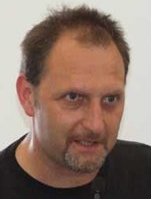 Ralf Heckel, advisor for Team Germany, shared these thoughts with us as he winged his way back home to the German Space Education Institute in Leipzig. Can’t wait to have your racers back next year, Ralf!
Ralf Heckel, advisor for Team Germany, shared these thoughts with us as he winged his way back home to the German Space Education Institute in Leipzig. Can’t wait to have your racers back next year, Ralf!
Delta Comair flight from Huntsville to Atlanta, 04/10/2009 12 a.m.
The small plane has reached its travel altitude of nearly 10,000 feet. We float in the midst of white mountains of clouds. Weirdly, they form gigantic summits, sloping bridges and deep valleys beside, behind and in front of us. Below, there is the fresh green country with the pink blossoming trees. Lakes sparkle. It is spring in Alabama.
The sun shines brightly on the giants of cotton. The pilot often changes direction and height. He seems to fly around the clouds. I feel like a fly in a gigantic white cotton field.
And I am exactly above that scene. Cotton was the main source of income here for many years. A small steam railway brought millions of fleecy white bales from the fields to the Tennessee River where workers packed them in small wheezing steamboats and navigated to cotton mills along the river. Then the bales were loaded into huge steamboats with gigantic red paddlewheels and were brought downstream from Mississippi to New Orleans.
That’s all been over for 50 years now. Only the culture of thousands upon thousands of agricultural laborers and their traders remained. In the evening they played their own music — a mixture of blues from the South and the mostly Scottish folklore of the north. They formed their traditions.
Today it’s known as Dixieland, as a kind of music. But only this word describes the country below me. At this height, you can hardly see a thing, but you can feel it. It is the southern mentality of the people down in Huntsville, Ala. They are kind and always ready to help.
The steamboats were drowned out by the tumult and quake of the rocket engines which became more and more dominant in the area. In a few years, the town and her surroundings developed from an agricultural idyll to a high-tech center which shortly thereafter sent 12 people to the moon.
The southern coziness was complemented with German precision and a hard-sounding dialect, and today this union, with deliberation and aim, moves not just mountains but worlds. The mentality of the German rocket engineers is not foreign at all; it’s the same. Everything is simply made or done, without grumbling; that’s the way to reach a goal.
The two words “Team Germany” are simultaneously an honor and an obligation in this town. Our moonbuggy team received this honor on the cover of The Huntsville Times this year (read the story here: http://tiny.cc/ahDXD) and I’m carrying two awards the team won at the race.
In the meantime, the countryside underneath me has disappeared. I reach the airport in Atlanta with its multinational character. The accents mix and let me know that here the whole world is at home. Everybody complements this big country in his or her own manner, with his or her own traditions.
We have had so many unique experiences these past days with the NASA Moonbuggy Race. I am curious how our students can use those experience, and how their achievements will be accepted by the people of my country.
There is one result only: For my generation it is a bond, a point of honor, to support the international youth in their discovery and pursuit of space exploration. So I use my time on the transatlantic flight to ponder ideas for a moonbuggy promotional tour across Europe and Asia, with international workshops in Germany.
Read more soon.
Thanks to Team Germany’s Christian Hein for translating!
